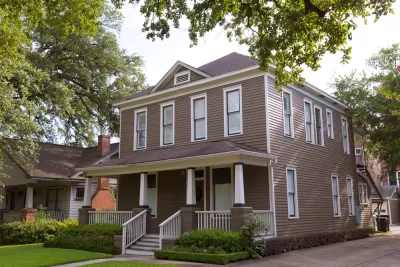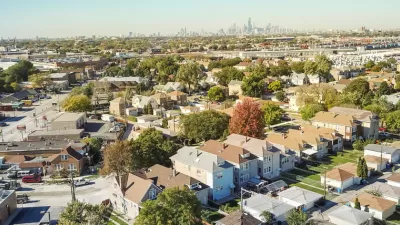New research that controls for financial factors the industry said would explain disparities shows that race still plays a major role in loan decisions.

"An investigation by The Markup has found that lenders in 2019 were more likely to deny home loans to people of color than to White people with similar financial characteristics—even when we controlled for newly available financial factors that the mortgage industry for years has said would explain racial disparities in lending," report Emmanuel Martinez and Lauren Kirchner.
The authors of the investigation "found that lenders were 40 percent more likely to turn down Latino applicants for loans, 50 percent more likely to deny Asian/Pacific Islander applicants, and 70 percent more likely to deny Native American applicants than similar White applicants. Lenders were 80 percent more likely to reject Black applicants than similar White applicants."
This new study took into account factors that the mortgage industry claimed would explain disparities, such as "debts as a percentage of income, how much of the property’s assessed worth the person is asking to borrow, and the applicant’s credit score." Far from exonerating the decisions, "[i]ncluding these financial data points in our analysis not only failed to eliminate racial disparities in loan denials, it highlighted new, devastating ones." In fact, the research shows "that lenders gave fewer loans to Black applicants than White applicants even when their incomes were high—$100,000 a year or more—and had the same debt ratios. In fact, high-earning Black applicants with less debt were rejected more often than high-earning White applicants who have more debt."
David Sanchez, a former Federal Housing Finance Agency policy analyst who currently directs research and development at the nonprofit National Community Stabilization Trust, says the industry has to think about less discriminatory methods for lending. "Because if we let risk alone govern all of our decisions, we are going to end up in the exact same place we are now when it comes to racial equity in this country."
FULL STORY: The Secret Bias Hidden in Mortgage-Approval Algorithms

Planetizen Federal Action Tracker
A weekly monitor of how Trump’s orders and actions are impacting planners and planning in America.

Maui's Vacation Rental Debate Turns Ugly
Verbal attacks, misinformation campaigns and fistfights plague a high-stakes debate to convert thousands of vacation rentals into long-term housing.

Restaurant Patios Were a Pandemic Win — Why Were They so Hard to Keep?
Social distancing requirements and changes in travel patterns prompted cities to pilot new uses for street and sidewalk space. Then it got complicated.

In California Battle of Housing vs. Environment, Housing Just Won
A new state law significantly limits the power of CEQA, an environmental review law that served as a powerful tool for blocking new development.

Boulder Eliminates Parking Minimums Citywide
Officials estimate the cost of building a single underground parking space at up to $100,000.

Orange County, Florida Adopts Largest US “Sprawl Repair” Code
The ‘Orange Code’ seeks to rectify decades of sprawl-inducing, car-oriented development.
Urban Design for Planners 1: Software Tools
This six-course series explores essential urban design concepts using open source software and equips planners with the tools they need to participate fully in the urban design process.
Planning for Universal Design
Learn the tools for implementing Universal Design in planning regulations.
Heyer Gruel & Associates PA
JM Goldson LLC
Custer County Colorado
City of Camden Redevelopment Agency
City of Astoria
Transportation Research & Education Center (TREC) at Portland State University
Jefferson Parish Government
Camden Redevelopment Agency
City of Claremont





























